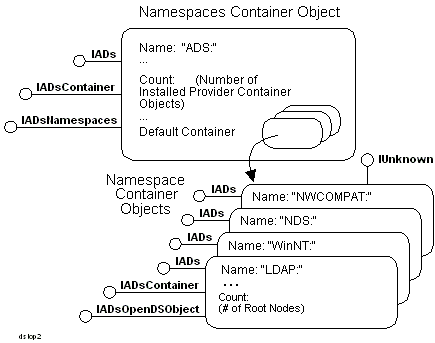
| Platform SDK: Active Directory, ADSI, and Directory Services |
Many directory services are hierarchical in nature and thus lend themselves to a hierarchical object model. This section uses COM object representations to illustrate various ADSI features.
In the following object model figure, a top-level system object contains one Namespace object for every installed ADSI provider.

Each of the Namespace objects is itself a container that contains the top-level root nodes of every server, domain, or whatever other kinds of directory-system objects are defined as roots in each directory service.
ADSI supplies a set of predefined objects and interfaces so that client applications can interact with directory services using a uniform set of methods. However, ADSI may not provide access to the complete functionality of a particular directory service. To help use the full power of each directory service, ADSI supplies a schema model that directory service providers and third-party software vendors can use to extend functionality beyond the interfaces ADSI offers.
The root-node container objects found within each provider Namespace object include an ADSI schema container object. This object contains the definition of all the functionality for that provider. For more information, see ADSI Schema Model.
This section describes the following topics: